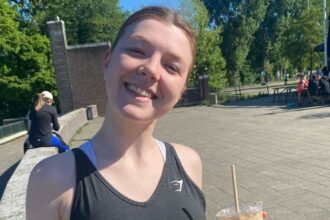In ELLE’s It Takes a Village series, the focus is on exploring the challenges faced by modern parents in terms of community support when raising children. With the traditional concept of a village to raise a child now seeming like a distant memory, many parents are left to navigate parenthood alone. The series emphasizes the importance of community and support for birthing people, highlighting the costly services that have emerged to fill the void left by the absence of a village.
The experience of becoming a mother in a foreign country adds an additional layer of complexity to the already challenging process of matrescence. In Taiwan, where the author gave birth, there is a strong cultural emphasis on honoring new motherhood. Local recommendations for night nurses, lactation consultants, and postpartum confinement centers were readily available, but the additional cost of these services can be prohibitive for many new parents. The shift away from a communal support system has led to the rise of expensive services aimed at assisting new parents in the absence of a traditional village.
The collapse of the village can be attributed to various factors, with the increasing number of women entering the workforce being a significant contributor. The lack of comprehensive support systems for new parents in the United States, such as paid parental leave and affordable child care, further exacerbates the isolation experienced by many mothers. As a result, companies offering services such as night nurses, postpartum meal delivery, and doula support have filled the gap, albeit at a high cost. The concept of motherhood as a personal responsibility has contributed to the lack of societal support for new parents.
The need for postpartum assistance is evident in the stories of mothers who have benefited from services such as night nurses, meal delivery, and postpartum doulas. The emotional and physical toll of childbirth and early motherhood can be overwhelming, making external support vital for maternal well-being. In countries with more robust support systems, such as Sweden and Germany, government-funded services help new parents navigate the challenges of early parenthood. The commercialization of postpartum support services reflects the societal shift towards individualized care for mothers.
Luxury postpartum centers like The Village and Ahma & Co offer comprehensive support for new mothers, including round-the-clock care, lactation support, and wellness services. While these services cater to a niche market of affluent mothers, they highlight the importance of prioritizing postpartum care and support for all mothers. The availability of affordable postpartum care remains a distant reality for many new parents in the U.S., leading to increased social inequalities and maternal health disparities. Government intervention is crucial in addressing these gaps in support for new parents.
The series underscores the necessity of community and support for new parents, especially in a modern society where the traditional village model of child-rearing has been eroded. By sharing personal stories and highlighting the challenges faced by new mothers, the series advocates for a more collective approach to parenting that prioritizes the well-being of both mothers and children. In a society where individualism often prevails, the concept of a village to raise a child serves as a reminder of the importance of communal support in the journey of parenthood.







